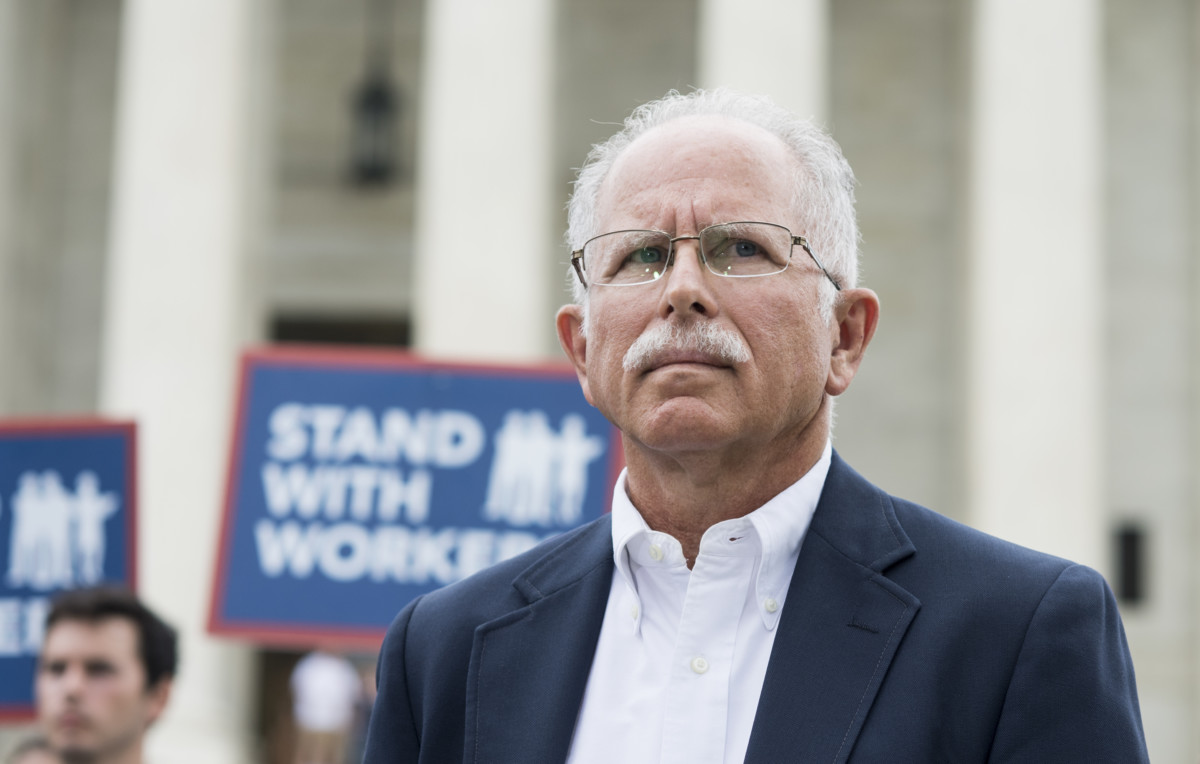Wednesday’s 5-4 Supreme Court decision in Janus v. AFSCME, which prohibits public-sector unions from collecting “fair-share fees” covering the cost of representing non-union members, is one of its most partisan decisions of the past half-century. In terms of siding with the economic interests of the über-rich over those of ordinary Americans, Janus is comparable to the Court’s political gift to the nation’s 0.01 percent in 2010’s Citizens United v. FEC.
The Campaign to Undermine Labor Rights
Janus effectively establishes “right to work” (i.e., a prohibition of security agreements that unions negotiate with employers) throughout the public sector. Rather than a stand-alone event, however, the Janus decision should be viewed as the culmination of the right-wing assault on public-sector workers and unions that began with Scott Walker’s election as governor of Wisconsin in 2010. Walker received millions of dollars in donations from out-of-state right-wing billionaires in order to secure his election victories and ensure the success of his anti-union agenda. Over the past several years, Republican lawmakers in Michigan, Ohio, Iowa, Florida, Kentucky, West Virginia, Missouri and elsewhere have continued this assault on public-sector workers and unions.
Negative Consequences From Janus
The Janus decision will likely have several negative consequences. First, millions of public-sector workers will be worse off — likely experiencing a decline in salary of several thousand dollars — as the bargaining power of their unions is diminished. This decline in wages will disproportionately affect women and workers of color, who already are lagging behind in our unequal economy. Whatever amount non-members gain from not having to pay “fair-share fees,” they will almost certainly lose far more in lower base pay and worse benefits.
Second, the pension schemes of millions of public workers will likely suffer a major hit. Several states already have underfunded public-sector pensions, and Janus will almost certainly exacerbate their woes. Due to funding problems, some state and local governments might abandon pension plans and shift employees onto inferior 401(K) plans.
Furthermore, the quality of public services, including K-12 education, will almost certainly decline due to a weakening of teachers and other public-education unions. Public-sector workers and their unions are the most effective advocates for students and public education in local and state legislatures throughout the country.
Finally, public-sector labor relations will likely deteriorate. The Supreme Court’s existing ruling on public employees (the 1977 Abood decision, which survived several previous right-wing attempts to overturn it) had largely ensured labor peace. As the recent teacher protests in West Virginia, Oklahoma and Arizona demonstrate, weakened unions and a lack of bargaining power do not ensure labor peace. In fact, they make more likely unpredictable and unstable labor relations, and this greater instability may turn out to be an unintended consequence of Janus.
Right-Wing Campaign to Weaken Unions After Janus
Anti-union organizations such as the Freedom Foundation are preparing to mount an aggressive campaign to persuade individual union members to resign their membership in states, such as Washington, Oregon and California. Although unions in these states will likely retain the overwhelming majority of their current members, they will need to expend far greater resources doing so — which is what anti-union groups want — and they will still be legally required to represent non-members who contribute nothing to the costs incurred on their behalf. Similar anti-union groups are gearing up to do battle in other states.
The Right-Wing Agenda Behind Janus
For the past half-century, right-wing organizations have attempted to confuse people by framing their attacks on US unions as an effort to protect the individual rights of ordinary employees. Nothing could be further from the truth — they are motivated only by the desire to destroy the collective voice of working people. The Janus decision has nothing to do with protecting the free speech rights of individual employees. Existing law already had safeguards protecting the rights of non-members, and non-members can and do opt-out of contributing to the cost of political activities of public-sector unions (which are largely lobbying efforts to secure greater funding for popular public services).
The sole intention of the shadowy right-wing groups behind the Janus case is to further weaken unions. Unions represent less than 11 percent of the workforce, despite the fact that almost every reputable survey indicates that millions of workers would like union representation but cannot get it. This is an inconvenient truth that right-wing organizations cannot counter — and well over half of the population has a favorable view of labor unions. Widespread public support for organized labor should come as no surprise. Unions and collective bargaining are some of the most effective anti-poverty tools US workers have had during the past 50 years.
The real beneficiaries of the Janus decision are far-right, anti-union groups and their billionaire paymasters. We desperately need stronger public- and private-sector unions in the US, not weaker ones. We also need a Supreme Court that will stand up for the interests of ordinary Americans, not for the economic and political interests of the 0.01 percent.
Trump is silencing political dissent. We appeal for your support.
Progressive nonprofits are the latest target caught in Trump’s crosshairs. With the aim of eliminating political opposition, Trump and his sycophants are working to curb government funding, constrain private foundations, and even cut tax-exempt status from organizations he dislikes.
We’re concerned, because Truthout is not immune to such bad-faith attacks.
We can only resist Trump’s attacks by cultivating a strong base of support. The right-wing mediasphere is funded comfortably by billionaire owners and venture capitalist philanthropists. At Truthout, we have you.
Our fundraising campaign is over, but we fell a bit short and still need your help. Please take a meaningful action in the fight against authoritarianism: make a one-time or monthly donation to Truthout. If you have the means, please dig deep.
